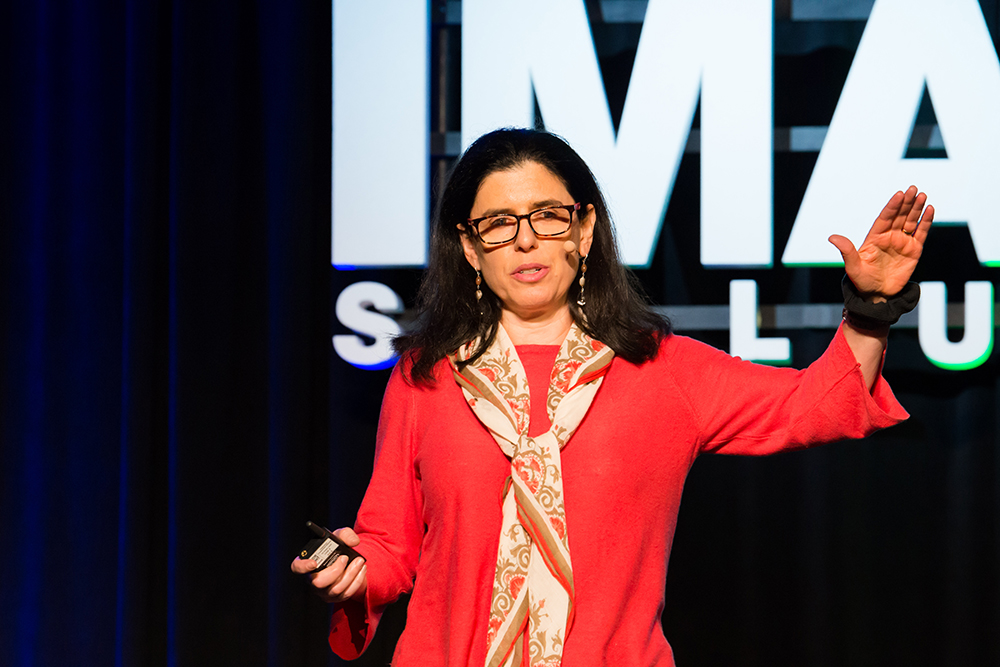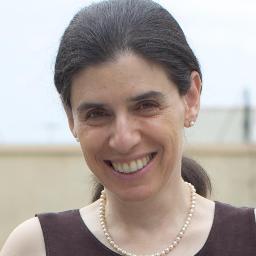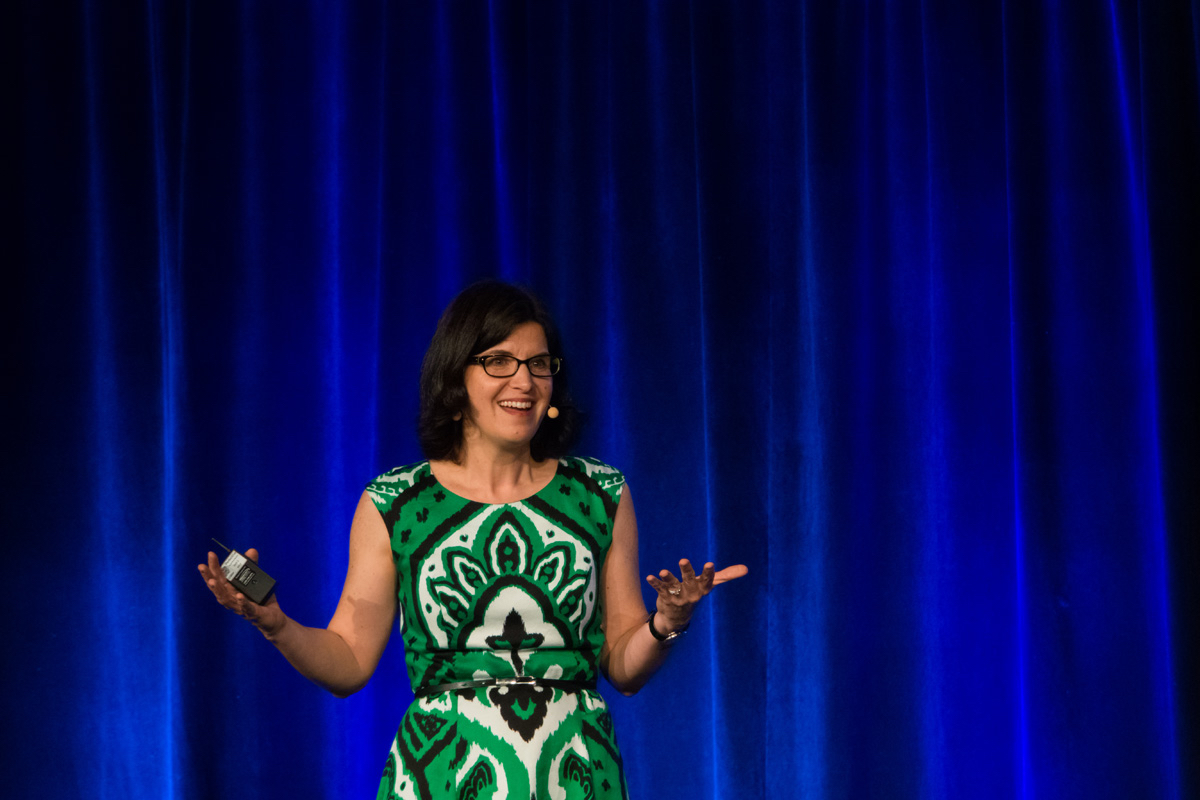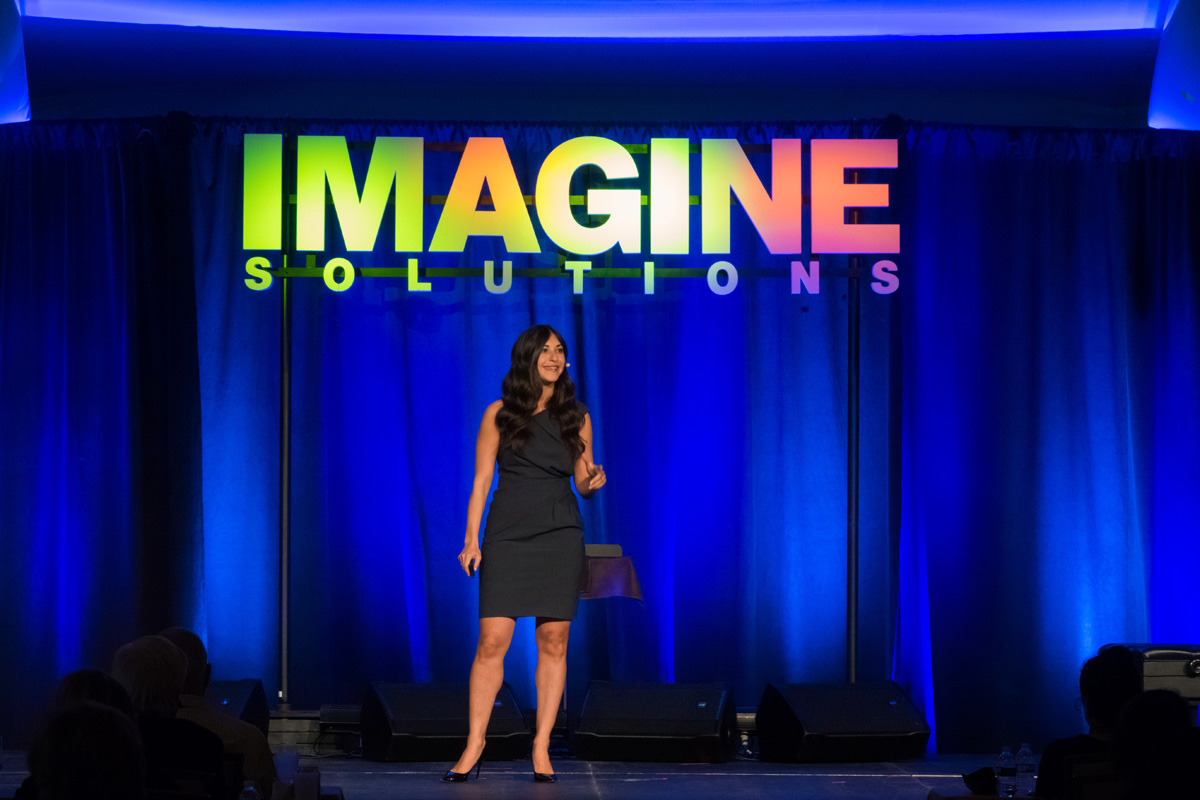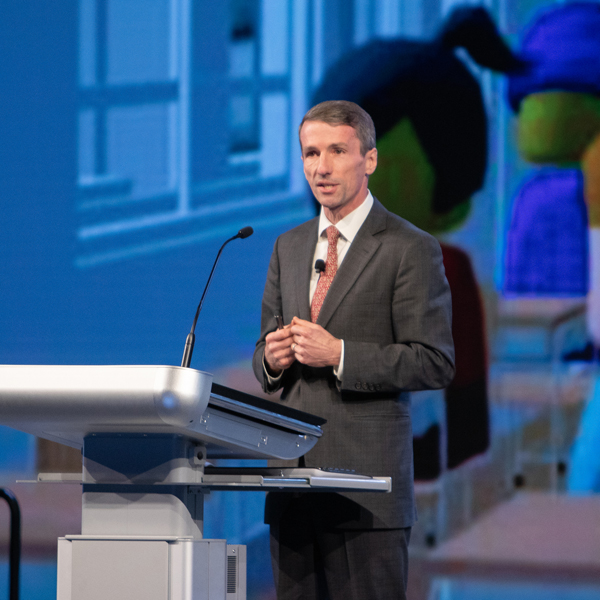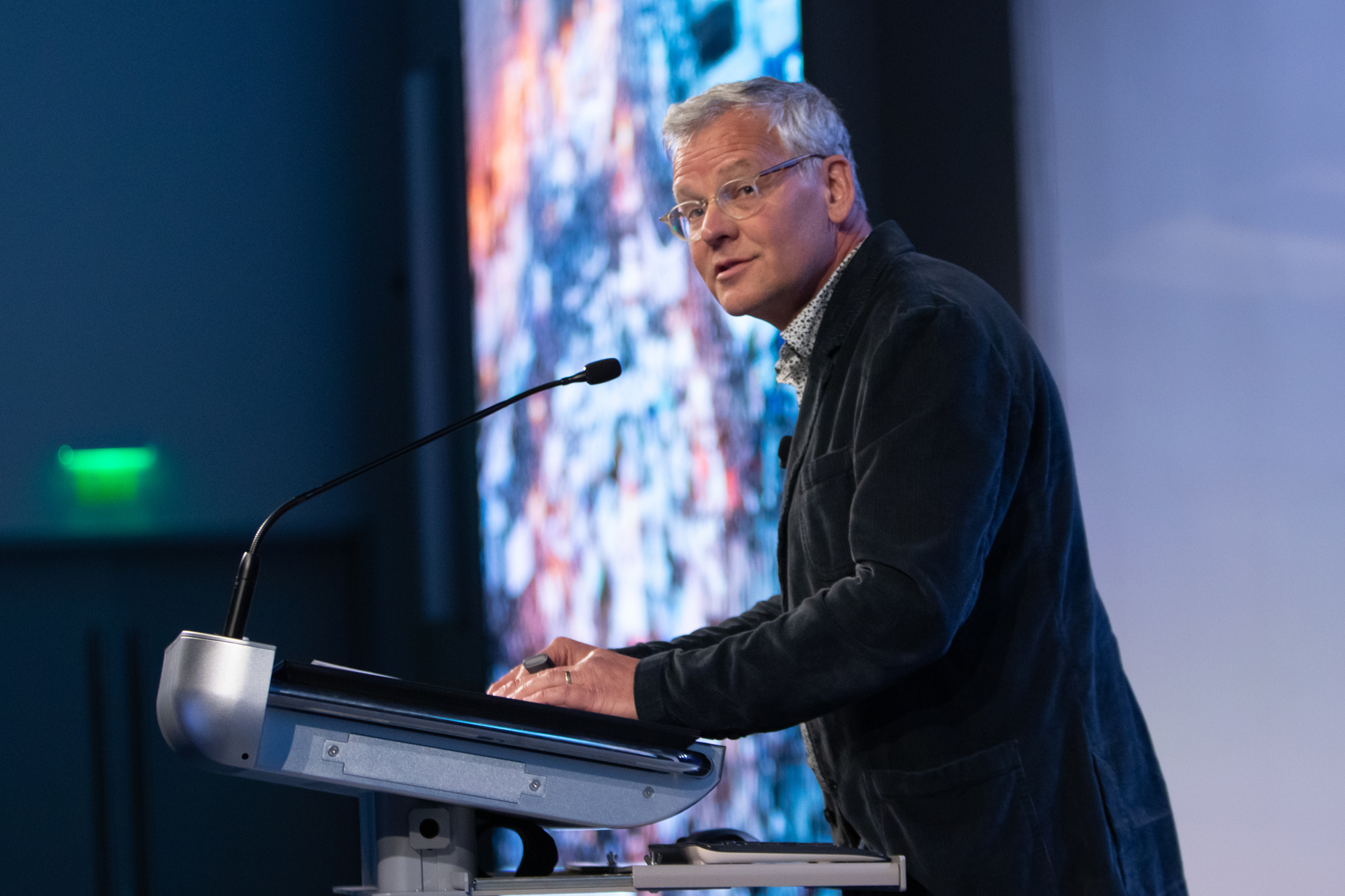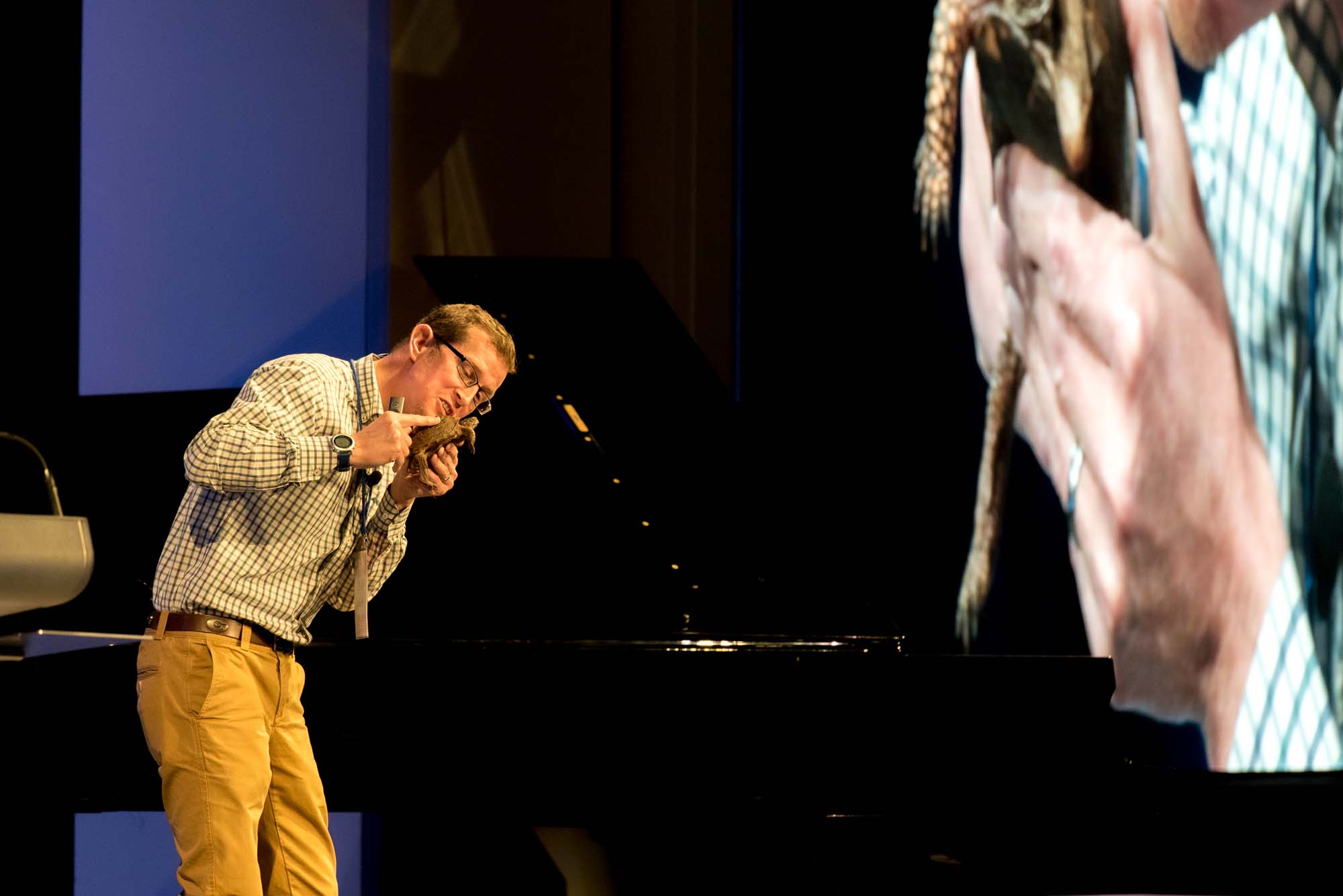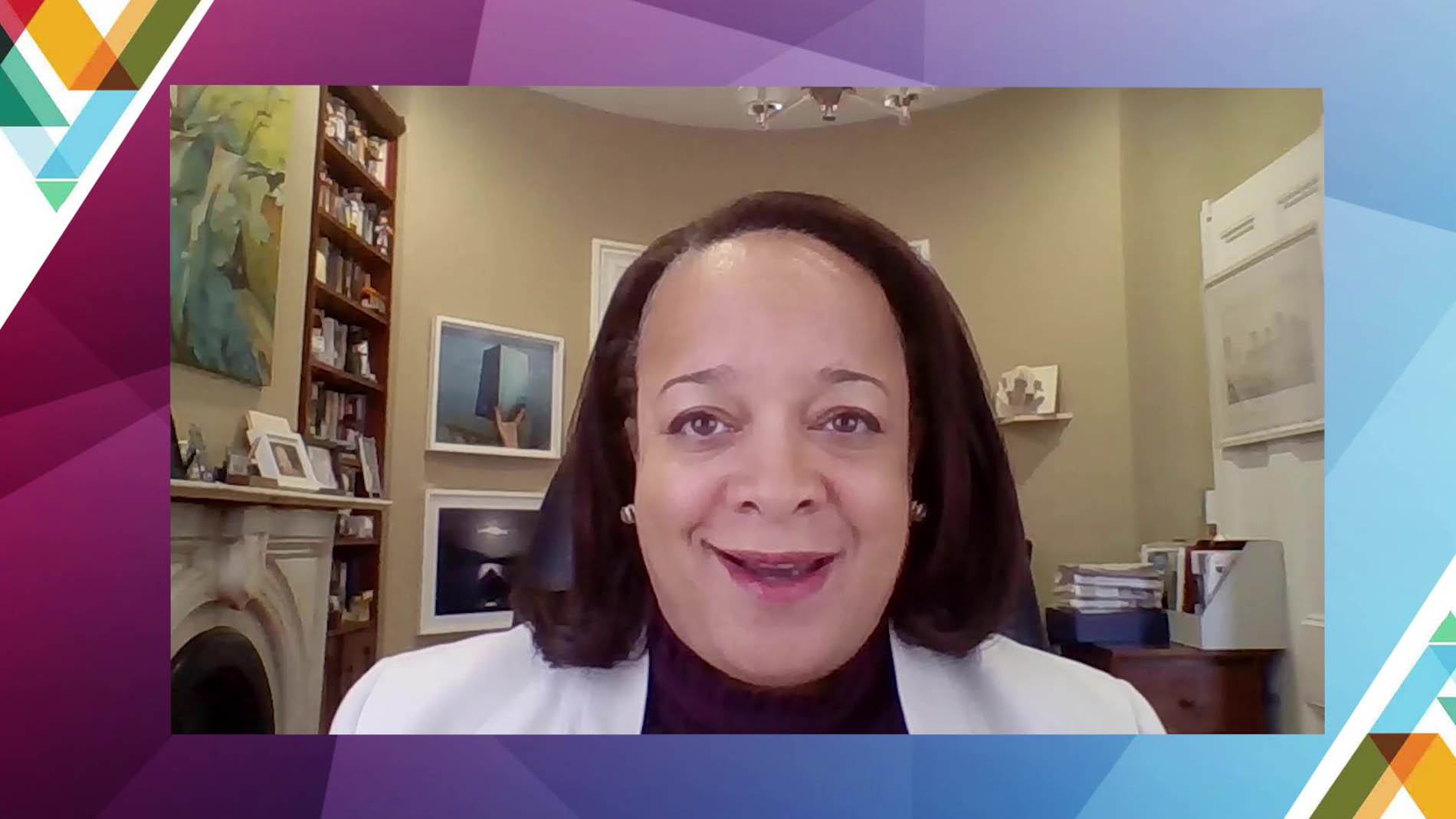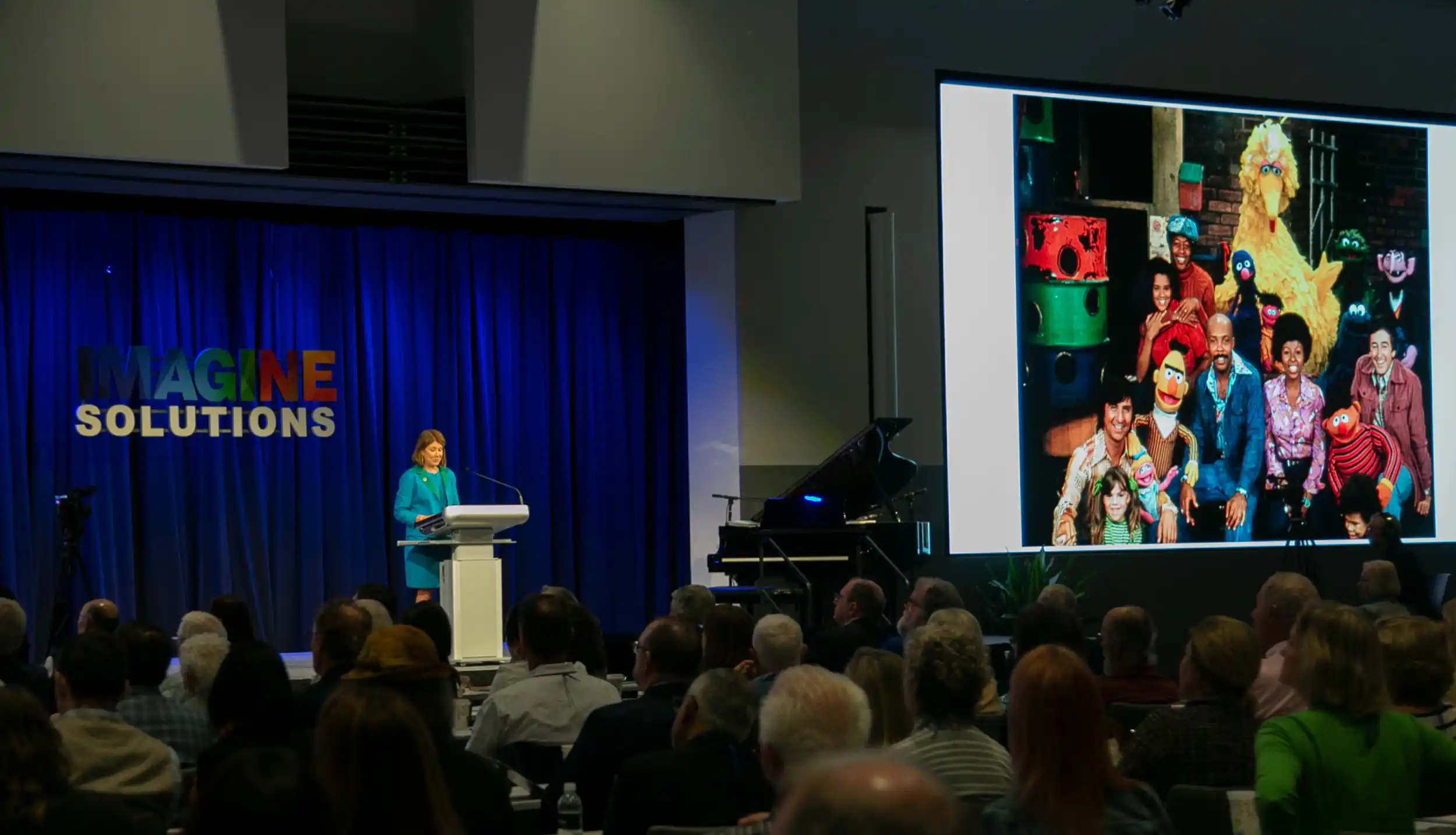People-Centered Learning
PowerMyLearning, the organization co-founded by Elisabeth Stock, approaches the intersection of education and technology from a deep understanding of and commitment to the power of relationships. When connections and interactions among students, their families, and their teachers are strengthened and enabled, learning improves. Not only does PowerMyLearning help students master academic subjects, they show improvement in critical social emotional learning, which is linked to future successes in life. Their platform uses technology to unite students, family members, and teachers, rather than function as a stand-alone substitute, to proven effect.
00.03
so when I was 22 and fresh out of college I went to Ghana West Africa to teach high school for two years as a Peace Corps volunteer and when I was there I had electricity most of the time I had no running water no phone no internet access I didn't have a car I didn't have a motorcycle which was a bummer but I did have a mountain bike so after teaching Monday through Friday I would hop on my bike on the weekends and bike out to local villages to get to know the culture better and to practice my Asante tree which is the language spoken where I lived so one Saturday I decided I would ride my bike along a dirt road out to a mud hut village about five kilometres out and the village was called more so and as I started to arrive in the village all these villagers were very excited to see me and they brought me over to the chief
01.01
and I did my meet-and-greet with the chief and then I said to the chief can I take a picture of you and he said of course and he called over all of his family and I mean this was a busload of people and they all lined up and I backed up to get them all in the frame and I snapped a picture and then I said so the chief I said can I take a picture of just you and he said this is the picture of just me Who am I without my family this is just me and I think what he was trying to teach me was that all of us exist in the context of relationships and this is a core principle of the nonprofit power my learning that I co-founded and have been running for the last 20 years now why is it a core principle because students also exists in the context of relationships we just call them learning relationships so for some time now we've been working with students with teachers and with families
02.04
and over this time a system of learning relationships started to become clear between them what we noticed was that the student who are most successful had a really strong triangle of learning relationships between the students teachers and families and what do I mean by successful I mean that the students could increase their mastery of rigorous standards basically do really well in school and they could also improve their social emotional learning skills and those are the skills you need not just to get to college but through college those are skills like persistence and growth mindset so today what I'm hoping to do is talk about this idea of the triangle a little bit about how we can leverage its potential the impact and how it's working and then I have an invitation for all of you of how you can join in so first the idea this is a triangle how could this be so fancy
03.00
complex how can this be such a powerful idea well the first reason why is because you see there's three nodes in a triangle we have the student the teachers and the families all in each of the three nodes and they're interconnected by these bi-directional arrows representing the learning relationships and what that shows you is that it's a system and the system when it's interconnected and all the nodes are connected you get a multiplier effect the second thing is in education for a long time we've tried all sorts of things to improve student outcomes we've done things like changing class schedule or changing whether a school is run by the school district or by a charter management organization and what I would argue to you is that if we don't have an impact on the triangle from those changes we will not have an impact on student outcomes then the third thing the final thing that makes this so powerful is the triangle has helped us as an organization be intentional about where we focus you see I shared before that I have a
04.01
background as a teacher I also have a background as an MIT engineer and at power my learning we're trying to leverage technology to improve student outcomes you can sort of say we're in the EdTech space but we're very different from other organizations in the EdTech space because other organizations they look at the same triangle and they go this is great they rubbed their hands together I can build the best software to do it a teacher can or I can build the most amazing code to do it a family member supposed to do and we think that that's a really terrible mistake because what it does is it pushes teachers and families out of the triangle and it replaces them with screens we have power my learning instead of focusing on the teachers and the families those two vertices of the triangle we instead focus on the arrows and on the sides of the triangle and how we can leverage technology to improve the learning relationships and by doing
05.02
that we can then bring the teachers and families tighter into the triangle so what about the potential how can we strengthen the triangle well let me share a little bit about our history so as an organization we started working on the right side of the triangle first the students a family side and what we did is we brought students and families into the school building and they had workshops and we saw the magic of what happened when they learned together then about 10 years ago cloud computing became a reality and we built a web platform with the help of the Gates Foundation and with that web platform we are now able to do work on the left side of the triangle where we were now doing teacher professional development and helping teachers improve their practice basically helping them stop teach to the middle and start teaching in a more personalized differentiated way we had a lot of success already at this point we were seeing that compared to schools that were not we were not involved in that
06.00
our schools were having 7 percentage points more proficiency each year in achievement but this wasn't enough for us we wanted to get to the bottom of the triangle too and we tried a whole bunch of things and all of them failed so we knew that we needed to be innovative and we decided to build a skunkworks inside the organization and go out and look to see what is the research literature tell us about interventions that can help with the bottom of the triangle and we found what we were looking for at Johns Hopkins there was a program they are called tips which is a paper-based program that was showing really great outcomes both on student achievement and social-emotional learning skills so we asked a professor named Steve Sheldon if he would advise us and help us take some of the core components of tips and bring it into our platform and he said yes and then that is how family playlist came to be so I want to talk to you a little bit about family playlists because it's our new breakthrough innovation so suppose I'm a
07.01
sixth grade math teacher and I'm teaching coordinate plane now I can now assign a family playlist to all the students in my classroom and cements to be assigned about every week or every two weeks not every day every week or two every two weeks now there's a particular student in my class that I'm really interested to see how she and her family do with the family place her name is Kim she's very energetic but she's also very shy so I assign the family place to my class and all this - all the family partners of the students receive this text message and it can come in one of 12 languages now Kim's case her family speaks English so you see the text message there in English her mom can click on the link and then the family playlist will then draw on her phone in her web browser she doesn't have to download an app she doesn't have to put in a password real easy so the first three steps of the family playlists are actually done by Kim her daughter by herself so the first step is Kim watches a little video of coordinate plane she then gets to practice a little
08.01
bit with the game she think gets to answer a couple questions to see whether she's comprehending and she's got it and those are great steps and lots of folks do though those are basically personalized learning 101 it's very good instructional design no magic they're done else have done have done everywhere where the magic actually happens is in this next step which is the family exploration because now what happens is Kim sits down with her mom for about 20-30 minutes and Kim has to teach her mom about coordinate plane so Kim becomes the teacher her mom the student so what does this look like so here's an example of an activity that we give to the students for them to teach their families coordinate plane Kim and her mom go get a piece of paper in their house they sit down they Joe the X the y-axis they plot their apartment at the origin at 0 0 they plot a couple of other buildings in their neighborhood and then Kim and her mom have to answer are there more buildings in quadrant 1 2 3 or 4 and give me a typical day of mom
09.01
going out into the neighborhood going to a bunch of different different ones of these buildings and that goes in the student response then mom grabs her phone takes a photograph of what they've done together and sends it back to me the teacher trying to advance here next slide okay oh sorry let me go back one let me tell you a couple quick things about the family exploration that are pretty important the first one is the reason why it's so powerful is because it makes use of something in the research literature called the protege effect the protege effect basically says that when you teach something to someone else you learn it better and you recall it better too the second thing is by having Kim play the teacher and her mom play the student it allows her mom to save face she might not remember coordinate plane how much of us remember how many of us remember that and the more that Kim's mom is confused or asked questions the better
10.01
Kim will actually learn it so I don't understand unpack that for me that doesn't make sense that actually helps Kim learn it and the third thing to note about the family exploration is that we purposely make these offline now I was saying before work attack I have a background as an MIT engineer why would we make them offline and the reason why we do that is cuz there's research that has shown that screens can actually damage relationships so if I'm out to dinner with my husband and I take my phone out of my purse and I pop it on the table even upside down it can hurt our relationship because it sends a signal to him that I care more about the people that are not in the room who can reach me through that phone than I care about him so we feel like the family exploration is a good time to put technology aside so the last step is the family feedback so now Kim's mom will give a cup answer a couple quick yes/no questions for me the teacher first one is how confident did Kim see went seem
11.00
when she was doing the coordinate plane activity not did she do it right but just did she seem confident then also was it fun do you know a little bit more about your what your daughter's doing in school and then we also have this open response box completely optional and that's going to come back a little later so remember that open response box so I know as a teacher I know get a report back of how all my students and their families then in the family playlist and I can see these are each row here as a student so I get lots of really valuable data that helps me now individualize my instruction the next day it also helps me look at my students more holistically know who they are build relationships with them so here's an example of some data that came back when we first rolled this out in the field this is Jayden and I'm using a pseudonym to protect the innocent this is the family coordinate plane that he and his mom did together and they also decided to send in a selfie which just happened
12.00
naturally in the field that wasn't something we were even requesting so what you can see about family playlists is while we were looking for a solution for the bottom of the triangle we ended up with a solution that went all the way around the triangle right so it's hid every one of those arrows and so we're getting the multiplier effect the other thing is we haven't taken teachers and Families out and replace them with screens what we're doing is using the technology to improve the learning relationships amongst these three constituencies so let me talk real quickly about some of the barriers that we were purposefully designing to address because we are a non-profit we are very focused on helping students and their families and their school systems and underprivileged areas so the three barriers we looked at the first one is the language barrier one in five students speaks a language other than English at home we solved for that barrier by making the translation I shared before we can translate into
13.00
twelve languages the second barrier is the technology barrier families earning $30,000 or less per year they only about 50% of them own a computer meaning a desktop or a laptop at home so we solved for that by making sure this was mobile because that same group of families are thirty thousand dollars or less per year like 92 percent of them own a phone and that date is actually a couple years old so I would imagine it's even higher and the last one is like a concern about equity that's something that we care a lot about we're not trying to just help those families that were already engaged yet more engaged and those families who weren't engaged stay not engaged because then we're just increasing the gap so what we've done around equity is we've created a longitudinal report for teachers so if I'm back to being the teacher again and I'm about to assign my fourth family playlist I can pull down a report and I can see what has been the level of family participation on the first three family playlist and I can
14.01
see from this report that I have three students in my class whose families have not participated at all so far so power my learning has created a culturally sensitive rubric so I can sit down and have conversations with those three kids I can say you know what's going on at home if mom is too busy what about dad if dad's too busy what about grandma you have an older brother an older sister you know and if those if I strike out in all of those I can say what about a neighbor do you go to Boys and Girls Club do you have a mentor and if I keep striking out I can say is there an adult in the school building other than me who asks you about how you're doing in school and what you're learning and a lot of times kids have relationships with like the lunch lady a janitor someone in the library so we can have someone like that play this role because we want to ensure that every student has a strong triangle each one of those vertices each one of those nodes so the impact how is it working so we rolled this out only a couple years ago in the
15.01
South Bronx at a school called South Bronx prep now it sounds like a charter school that's actually not it's a district school and when we it's a school we'd been working with for a couple years and when we approached the principal and told her we'd like to try this in her school she said you don't want to do this here and we said why not she's like I've been in this building for more than 10 years and we have struggled with family engagement like we're getting maybe 30% of families coming to anything and she's like and I know how this works you want to pilot it here you want to get great results you want to raise money and you want to scale it right I said right she's like that's not gonna happen here and I said well let's give it a try so she said all right and we rolled it out with the math team the 6th grade math team and what we saw was that 91 percent of the families participated in a family playlist now that was a big surprise and it certainly busts the myth that families from underprivileged backgrounds don't care or don't want to
16.01
be involved they want to be involved but the other thing that was most surprising for me was that 84% of the participant participating families chose to submit feedback to their child's teacher through that open response box that was totally optional and I don't know about you guys but when I see an open response box that's optional I'm like I'm not filling this in like I have to come up with a cogent sentence I get no credit like I just hit next so the fact that 84% of them filled that in then we were really onto something and what we saw from the feedback they gave back to the teacher we saw things that were filled with emotion and pride so I'll give you an example so one parent wrote back and said I enjoyed working with my son on this assignment it showed me how different it is compared to the time when I was in school the work has gotten a lot harder and I'm very proud of my son's accomplishments so since then we've gotten even more feedback and
17.01
we've actually rolled out a new starter family playlist where the first playlist asks students to pick a family partner that they're going to work with and explain why and so these are some of the feedback that we got and I think I have to stand over here to read it because it's covered here so hold on it says I wanted to work with my mom because she's cool smart and the most important thing in my life and I enjoy that it gives me and my dad and this is no joke I promise you we didn't pay anyone to say this gives me and my dad a chance to bond over math equations and now I can show him that the methods are different than when he was in school so these results have really helped us get attention and start to send bring this to other places in the country so we started with only two schools our first year we're now gonna be in over a hundred this year including schools in Florida but what I wanted to share with you is two stories that meant the most to me in terms of
18.01
the impact so the first one is a story that comes from Jean Dalton who's the principal of two PS 279 in the Bronx it's a very under-resourced community I think she has 20% of her kids in transient housing and I brought some guests into her school and they asked her what impact is this having and she said well you know we're in New York and in New York we have the state test but good thing is a couple years ago they decided to stop timing it so the kids can take as long as they want you to take the state test she's like so then this year is the first year we rolled our family playlist and I go to check on the kids it's about an hour after the bell has rung and they're allowed to leave she's like in the past years the minute that bell would ring they'd be out of there she's like but I go in it's like an hour after and I go into that room expect me to see nobody there she's like in half my students are still there taking the test and I says to them guys the bell rang you can go they're like no no no we got this we got this she's so I left and then about a couple
19.01
hours later rounded the building again I had a quarter of my students she's like it's six o'clock I still had two students left I was like guys okay go home go home she's like the stamina the persistence she's like it brought me to tears and I said to her that's an amazing story but why are you attributing that's a family playlist I'm not seeing the connection and she said because these are sixth grade students teaching their parents about sixth grade math and those parents they're not in the zone of proximal development it's not like they have all the building blocks already there they're struggling these kids are struggling to help their parents learn these concepts and if they can struggle to help their parents they're gonna struggle that they're gonna be willing to struggle themselves then the second story actually comes from a teacher a second grade teacher in Chesterfield Virginia and she told us that after rolling out family playlists' the kids when they were having discussion in class their vocabulary was
20.00
so much better much more fluid and the kids had a much better sense of themselves as learners and I saw this same thing because when we were doing a focus group with the kids from South Bronx Prep these were sixth graders they would talk about they would they would be talking about family playlists that they might have done three months ago and they would talk about it like it happened yesterday like their memory was so strong of it it was so salient for them and they also then talked about how these family playlists how when they would sit down to do these with their parents they would say like every single student had the same story I'd have to say mom put your phone down come on but you gotta concentrate you're distracting yourself and I know you're distracting yourself because this is hard but you know what sometimes when it's hard I learn it better and we're together we can do this come on mom we can do this and so what I was hearing the kids saying is that they were actually teaching their family members growth mindset they're teaching their
21.00
family members even though it's hard you can push through intelligence does not fix it's something you can can work on it's something that's malleable so those were the most meaningful for me but I also want you to hear from one of our students so this is a student named Maria again it's a pseudonym and I will let you hear from her uh-oh we need sound guys we need some sound I think they're working on it she was much louder when I saw her so hold on do you guys want me to keep going or you want to put her on she really didn't question the little kitchen day for the school so I have to like teacher in the
22.01
fourth cuz she wouldn't understand it and also like sometimes I struggle with words in Spanish so you know way like I like doing your haircut I got I got a some more time and I get to be like teachers in the future I want to be a teachers there it is kind of big I'm hoping like it tells me if she really understood it so the question I have is how can we get more Maria's and this is where I want to throw out an invitation to all of you so first of all I think each one of us in this room has played the role of one of the people in this triangle so my first question is who in this room either now or at some point in
23.01
your life has played the role of a classroom teacher okay keep your hands up who in the room has played the role of a family member where you had a young person in your house you're trying to teach them and with it and who in this room at some point in their life has played the role of a student okay so all their hands now the triangle is often invisible to us as relationships can be invisible but if you looked around the room and all those hands were up you can see the power of it and you can see that all of us are already in the triangle and all of us can make a difference in the triangle so I want to invite you to help if any of you know a principal or superintendent where you live who you think would be interested in this have them call us that will help if any of you want to donate to help us grow we're trying to build more family plays particularly in science and in ela and also age down right now they're mostly grades three through eight that would really help us if you can spread the word about the triangle that would really help us so I invite you to
24.01
take out your phone to type join camel organs your phone's web browser you'll then be able to share with me and how you can help and after you do that you'll be able to download a family playlist it's a really cool science family playlist that you could do with your kids or with your grandkids back home because together I think we can help all kids have a strong learning and triangle and that is the power of power my learning thank you [Applause]

